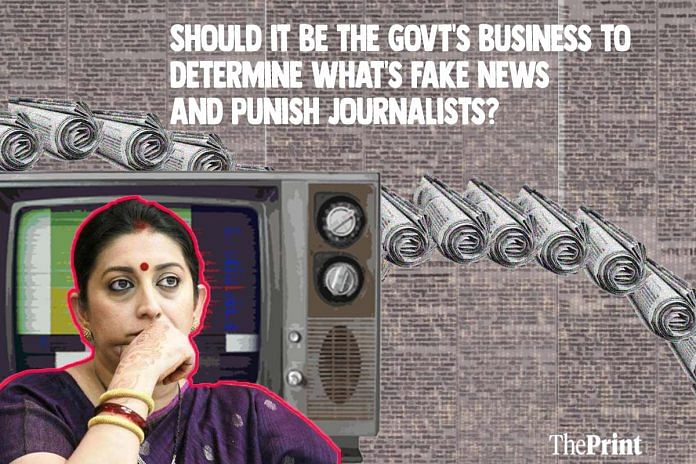The Centre is preparing to crack down on journalists publishing or propagating fake news. It plans to suspend — and for subsequent violations, cancel — the government press accreditation given to journalists if they publish/broadcast fake news.
According to the amended guidelines, any complaint received about fake news in print media would be referred to the Press Council of India, while those pertaining to electronic media would be sent to the News Broadcasters Association.
ThePrint asks: Should it be the govt’s business to determine what’s fake news and punish journalists?
Fake news is largely peddled by political warriors, the govt’s move is a sinister attack on mainstream media

YP Rajesh
Executive Editor at ThePrint
The BJP government of Prime Minister Narendra Modi has made it known from day one that it has no love lost for the mainstream media, the same media it used so effectively to create a wave and ride to power. Communication by the government has since been largely one-way traffic, mostly through social media, radio addresses, and carefully orchestrated interviews.
It worked for a large part because the media was awestruck by the might of the first full-majority government in three decades, and that too one which was India’s first genuinely right-of-centre government. Access to the powerful was a big carrot and the media was always made to feel like it had a beta-carotene deficiency.
But it only took a few governance bloopers and some glaring electoral and political setbacks to change the tide and the headlines; and for sections of the media to begin rediscovering their spine in the last year or so of the term of the BJP government.
So, is it just a coincidence now, exactly a year before the Lok Sabha elections are due, that the information and broadcasting ministry of Smriti Irani wants to crack down on “fake news” produced by accredited journalists?
Fake news, mind you, is a serious problem. But it is not a problem that has its roots among accredited journalists, who are journalists with at least five years’ experience, work for media organisations in the National Capital Region and are thoroughly vetted before getting accreditation.
Fake news has grown and thrived as a phenomenon because of dubious websites, social media and WhatsApp messages “forwarded as received”. Political warriors across the spectrum, including many patronised by the powerful in this government, are suspected to be behind the fake news factories, and independent and credible media outfits have begun exposing them. For the government to seek to divert attention towards accredited journalists and go after them is nothing but a sinister attack on mainstream media.
Freedom of speech and expression don’t entail the freedom to be a purveyor of fake news
 Raghav Awasthi
Raghav Awasthi
An advocate and an RSS member
I don’t understand why anybody could have a problem with this. Fake news is obviously a problem. Fake news propagated by journalists might create a situation where there is a riot.
Take the example of what happened in Gujarat recently, where people said there was a Dalit man who was beaten up for riding a horse. It was found to be completely fake, there was no truth to it, and after the preliminary report, even police contradicted it. But this is what happens when fake news is published, especially in this era of rapid digital communication. It’s like the saying: A lie goes half way around the world before the truth has a chance to put its shoes on. So there is absolutely no reason why fake news should not be taken to task.
The procedure that has been laid down is quite transparent. The government has no role in it. The Press Council of India (PCI) is technically a statutory body and the News Broadcasters Association (NBA) is run by people who are in the media business. So at its heart it is basically a peer review mechanism, and a journalist loses accreditation after his peers say that he is a purveyor of fake news. I don’t see why anyone should have a problem with it.
The consequence envisaged here is revocation of accreditation, so if somebody is not an accredited journalist and just uses a social media account, then there are other provisions of law that will be brought to bear upon them. They cannot lose accreditation if they do not have accreditation in the first place.
Accreditation also entails certain privileges, one of those is that you have access to government offices etc. So this is just one additional sanction that would be brought to bear on someone who peddles fake news and is an accredited journalist.
Freedom of speech and expression don’t entail the freedom to be a purveyor of fake news, or to remain accredited after peddling fake news. For instance, recently journalist Sagarika Ghose said something about how semen filled balloons were being pelted at women. She says something like this when you don’t know what the chemical properties of the substance are. It means these people lack bonafides, and there is no good reason their accreditation should not be cancelled. There is no good reason why people like her should remain accredited after they are caught peddling fake news.
We, as journalists, are accountable to the people of the country, to our readers and our viewers

K.G. Suresh
Director General, IIMC
Whether or not a given piece of news is fake would be determined by the Press Council of India (PCI) and the News Broadcasters Association (NBA), so I see no government interference in that. Both the PCI and the NBA have independent journalists as members, and if journalists themselves are ready to determine if something is fake news, and recommend that the accreditation of a particular colleague needs to be revoked, I think that would be fair enough.
For me, the freedom of speech and expression comes with a lot of responsibilities and we, as journalists, are accountable to the people of the country, to our readers and our viewers.
I do not subscribe to the idea that fake news exists only on social media. I believe there is fake news in the guise of paid news. There are motivated stories in print and electronic media as well, so let us not blame social media alone.
I personally think the removal of the black sheep among us will only add to our credibility. But let us do it as an industry, cutting across all narrow considerations. Let us come together. It is about the credibility of the media because fake news has the potential to damage the social fabric of the country. It is a big threat, let us accept it. Let us not view it as a step the government is taking only because there is news against the government. I think this is a threat with larger implications not just for the fourth estate, but also for democracy at large.
For now, it seems like the majority who contribute to fake news will continue doing what they do

Pankaj Jain
Founder, SM Hoaxslayer
Over the last few years, fake news has been a global plague. It has gone from spreading pranks to spreading hatred, and even led to people’s death. Fake news is so powerful it can make or break governments.
‘Fake news’ is a vague term — it breaks down into different genres. It can be in the form of a lie, which can be easily disproved, for example photo-shopped images, and edited or trimmed videos. Photos and videos from different years and different countries with incorrect captions also fall into this category. But a different genre is misleading, twisted news, which can’t be proved wrong rightaway.
The biggest contributor to fake news currently is social media. An example of this is WhatsApp, where people with fake accounts and shady websites spread false information. These people are not verified journalists, ministers or celebrities. If the content matches peoples’ bias and opinion, they spread it further without any fact-checking.
Everybody has been looking for a solution, or some law, to stop this mess.
This new fake news rule seems to affect only journalists. So, for now, it seems like the majority who contribute to fake news will continue doing what they do. We should wait and see the results of this rule before passing judgement on it.
Compiled by Divya Narayanan




Fake news should be made punishable.
One more fake news from print.
An intriguing initiative, considering fake news is a recent phenomenon and generally associated with the right wing.